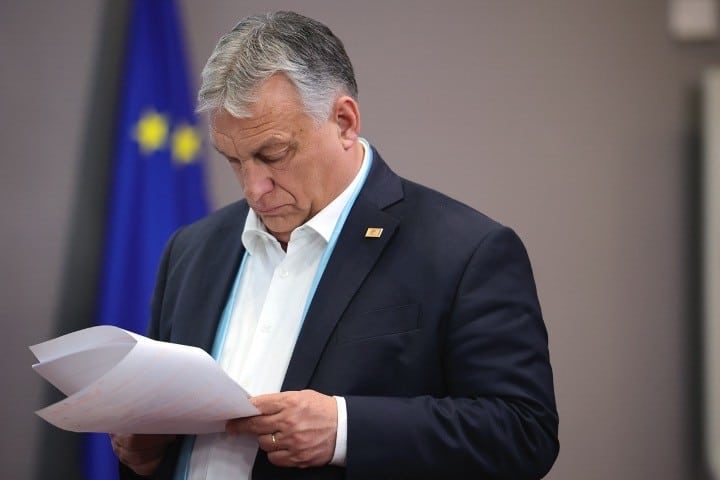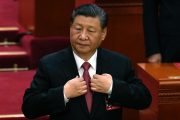
SINGAPORE — As the Ukrainian military faces increasing challenges in recruitment, European leaders have started to consider mobilizing “peacekeeping” forces in Ukraine, according to Hungarian Prime Minister Viktor Orbán.
In an interview on Hungarian radio station Kossuth Rádióon March 31, Orbán admitted that it is “close to a legitimate, accepted, well-established question in the conversation between European leaders as to whether or not the member states of the European Union can send peacekeeping troops in some form or not.”
“We are close to this border that was previously thought to be impassable,” the Hungarian leader acknowledged. Since “the West is providing Ukrainians with more and more modern equipment, I am convinced that the threat of world war is not a literary exaggeration.”
Orbán elaborated, saying that “when European and American leaders say that if this continues, we may end up in the Third World War, this seems like an incredibly exaggerated sentence at first. But where I work and where I see the events, this is a real danger at this moment.” He had previously warned this could result in a direct clash with Russia.
Alluding to Orbán’s mention of “peacekeeping” forces in Ukraine, Kremlin spokesperson Dmitry Peskov said that “if we are talking about some serious ‘verbalizations,’ then this, of course, is an extremely dangerous discussion,” based on a report by Russian news outlet TASS.
The same report cited Peskov as saying that, in international practice, peacekeeping forces are typically mobilized with bilateral consent. “In this case, this is potentially a very dangerous topic,” he affirmed.
On his Telegram channel, Dimitri Medvedev, former Russian president and deputy chairman of the Russian Security Council, cautioned:
It is obvious that such “peacekeepers” are our unvarnished enemies, wolves in sheep’s clothing.… [Their] true intentions are crystal clear—to impose a peace that is favorable to them on the line of contact from a position of strength and to station their “peacekeeping” troops in Ukraine, who would be armed with assault rifles and riding on tanks, and would be wearing some sort of blue helmets with yellow stars.
It is clear that the so-called NATO peacekeepers [are] simply preparing to enter the conflict on the side of our enemies in order to make hay out of this, bringing the situation to the point of no return, and to unleash that World War III they claim to be so afraid of.
Is Europe prepared for a long line of coffins holding its “peacekeepers”?
Since the onset of the Russo-Ukraine crisis last February, Budapest has repeatedly expressed fears that rising Western military support to Ukraine — as opposed to peace negotiations — could catalyze an open war between NATO and Russia — which Hungary, as a NATO member, would have to participate in due to treaty obligations.
Orbán has openly doubted Ukraine’s viability as a sovereign state, with his government lining Budapest’s streets with anti-sanctions billboards. So far Budapest has refused to supply Kyiv with weapons, despite condemning Russian actions in Ukraine.
“It’s Afghanistan now,” Orbán said, based on a report by The American Conservative. Vladimir Putin will not lose, and time is on Russia’s side, he asserted, calling Ukraine “the land of nobody.”
Although most Western allies have backed Ukraine’s efforts in the conflict, Hungary has been reiterating its stance that Kyiv should simply stop fighting. “Our elementary humanity and sense of morality,” Orbán said, “demands that we do everything we can to freeze the front line, for there to be a cease-fire and for negotiations to start.”
While Hungary and Russia have had friendly relations and economic ties, the Kremlin recently included Hungary in a group of foreign states that it asserted had committed “unfriendly actions against Russia, its companies and citizens.”
In an interview with Russian news agency RIA Novosti, Russia’s envoy to Budapest, Yevgeny Stanislavov, remarked that as Hungary had signed “all the anti-Russian sanctions packages of Brussels” and is thus “forced to strictly comply with them,” Moscow had to downgrade their relationship status, though remaining open to dialogue.
In addition to speaking on his anti-war stance regarding the Ukraine conflict, Orbán, a longstanding and outspoken supporter of former U.S. president Donald Trump, penned a message of public support to Trump on April 3. Trump, who faces a criminal indictment over purported “hush money” payments, has dismissed claims of wrongdoing and maintains that the case of George Soros-funded N.Y. District Attorney Alvin Bragg is politically motivated.
In a Twitter post, Orbán encouraged the beleaguered Trump to “keep on fighting,” adding a photograph of the two heads of state shaking hands during a previous meeting at Trump’s Bedminster, New Jersey, estate. The photograph was taken before the 2022 Conservative Political Action Conference (CPAC) in Dallas, Texas, where Orbán gave an address stating that liberals and progressives “hate me and slander me and my country as they hate you and slander you and the America you stand for.”
“Keep on fighting, Mr. President! We are with you,” Orbán wrote.
In 2016, Orbán was the first European leader to publicly back Trump’s presidential candidacy. He also eagerly endorsed Trump’s campaign in 2020. In the same year, Trump reciprocated the Hungarian leader’s support, lauding Orbán as a “strong leader” who “truly loves his country” and praising his efforts to halt illegal migration into Europe.
“He has my complete support and endorsement for re-election as Prime Minister!” Trump declared in a statement in January 2022.
Following Orbán’s public backing of Trump in his indictment, the Biden-appointed U.S. ambassador to Hungary, David Pressman, who has a track record of claiming that Orbán’s government supports pro-Kremlin policies, juxtaposed Orbán’s remarks with Hungarian Foreign Affairs Minister Péter Szijjártó’s statement that Hungary shows its respect to other countries and does not meddle with their internal politics.
In February, Szijjártó responded to Pressman’s denunciation of Hungary’s position on the Ukraine conflict, saying: “We are not hosting governors and deputies who I assume are sent here to tell us how to live in our own countries. That era is over.”
Szijjártó asserted that Pressman “has no business interfering in Hungary’s internal affairs, and if he wants to use his time in Hungary to criticize the actions of a government that was elected by a fairly clear majority of the Hungarian people and has the authority of the Hungarian people, he will have a very difficult time working effectively to improve cooperation between the two countries.”



